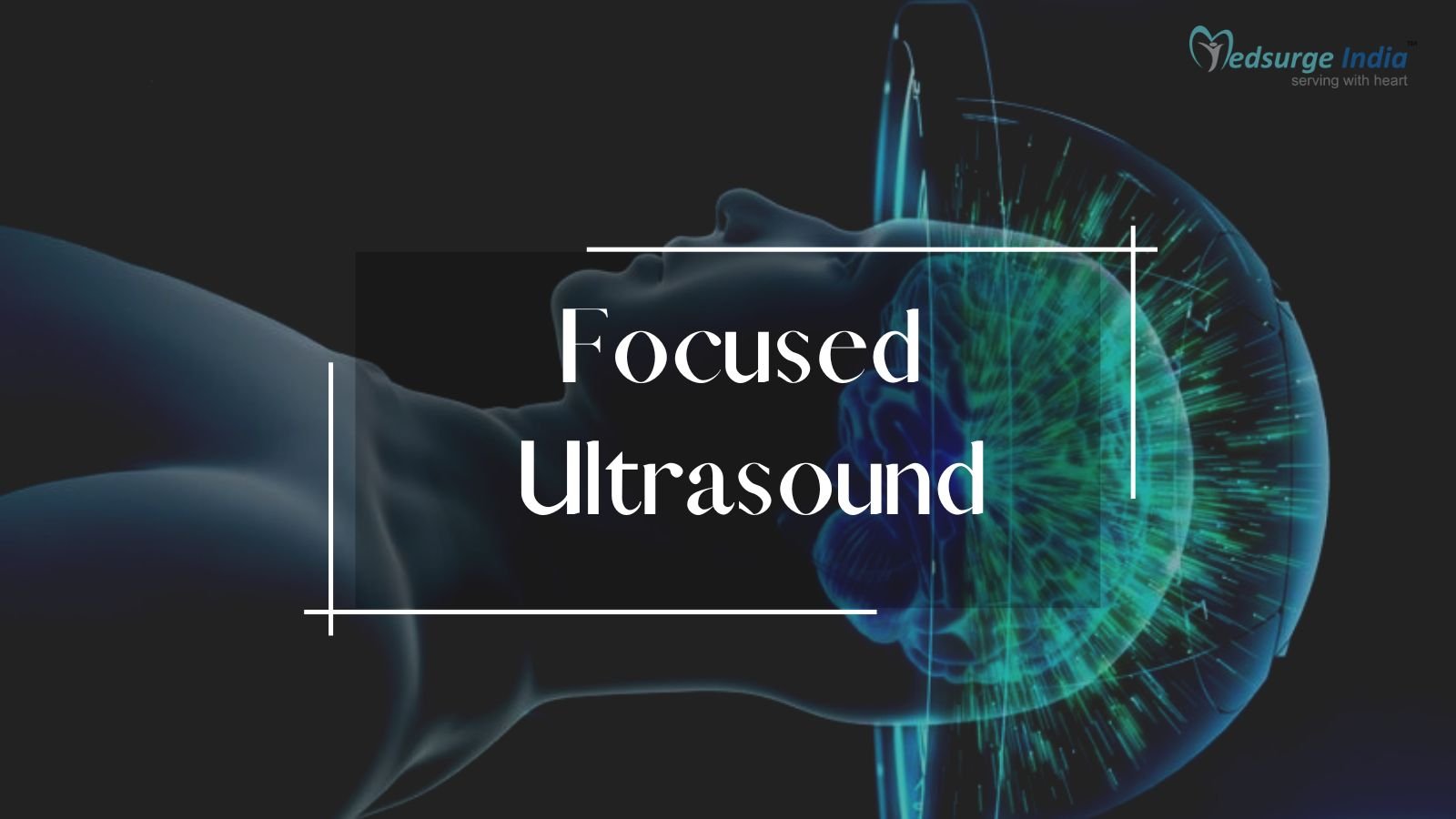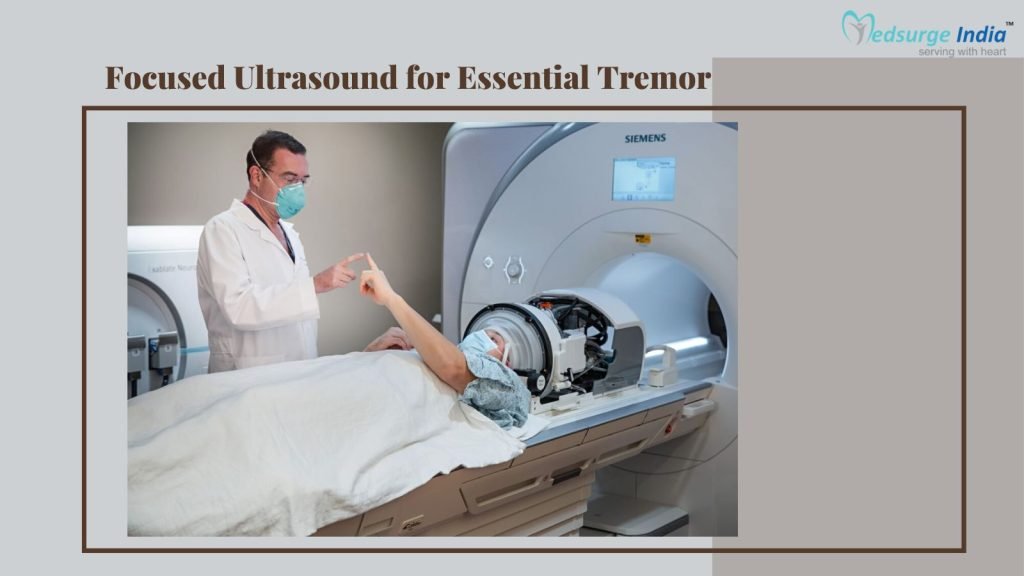
Focused ultrasound is an incision-free, minimally invasive treatment for essential tremor, a neurological condition characterized by uncontrollable shaking – most commonly in the hands, head, or voice – during movement. Essential tremor in India is the most common movement disorder, affecting an estimated 10 million people. Some people’s shakiness is so severe that it inhibits their functioning ability. Although the causes are still unknown, research has shown that the tremor can be relieved by treating a small region deep within the brain that regulates movement; this relatively small region is known as the ventral intermediate (Vim) nucleus of the thalamus.
What is Actually MR-Guided Focused Ultrasound?
MR-guided focused ultrasound is a treatment method that combines two technologies:
- Magnetic resonance imaging (MR) aids vision and planning by providing surgeons with clear and highly detailed images that aid in targeting the area to treat and monitoring treatment progress.
- Ultrasound (sound waves) is a type of energy that can penetrate through a wide range of tissues, including skin, fat, bone, and muscle. Highly focused ultrasound is the method of treatment. Guided by the MR images, over 1,000 ultrasound beams are concentrated and focused on a specific target in the body. The beams raise the temperature of the targeted tissue area. The heat causes a burn that destroys the targeted tissue while leaving the surrounding tissue undamaged.
What Neurological Conditions can MR-Guided Focused Ultrasound Treat?
The Food and Drug Administration in the United States has approved focused ultrasound for the following conditions:
- Essential tremor: MR-guided focused ultrasound has been approved for the treatment of essential tremor that is uncontrollable with medication. Only one side of the brain has been approved for treatment. Patients must be over the age of 22.

- Tremor-dominant Parkinson’s disease: MR-guided focused ultrasound is approved to treat Parkinson’s disease patients whose primary symptom is tremors. Patients must be over the age of 30.
Other neurologic conditions being studied includes tremors associated with multiple sclerosis, epileptic seizures that cannot be controlled with other treatment approaches, other movement disorders, stroke, brain tumors, and neuropathic pain. At the moment, treating these other conditions is considered experimental.
What is the Evaluation for Treatment?
If you are referred to the MR-Guided Focused Ultrasound Program for treatment, you will undergo a CT scan to determine whether the shape and thickness of your skull are appropriate for focused ultrasound. (Some skull features prevent the focused ultrasound from delivering enough heat to the target tissue to be effective.)
If an evaluation reveals that this treatment is not relevant for you, your doctor will discuss other options for relieving your tremor with you. Among the many advantages of focused ultrasound over other treatments are:
- It does not necessitate traditional surgery. Because there is no incision or opening in the skull, the risk of infection is reduced.
- It precisely targets the area of the brain associated with tremors while causing no harm to surrounding healthy tissue.
- It is an outpatient procedure with a quick recovery period.
- The majority of patients notice an immediate and significant reduction in tremors. The effect can last for up to three years.
- Patients are not subjected to radiation.
How Focused Ultrasound Treatment is Performed?
- The procedure is carried out while you are inside an MRI scanner. Medical team will shave your head before you enter the machine to prevent hair from obstructing the sound waves. You’ll be wearing a cap that allows cool water to circulate, protecting your scalp from the heat of the ultrasound, and your head will be secured in a frame that prevents it from moving during the procedure.
- You’ll be awake and communicating with expert. Team will be in a room next to the MRI suite, using a computer to plan and execute the procedure. They use MRI scans of your brain to precisely locate the target area and then confirm the target with small doses of ultrasound energy. Once they are confident for the location, ramp up the focused energy to have a long-term effect on the area.
- Your vital signs and brain temperature will be monitored by doctors. Throughout the procedure, your doctor will ask you questions and have you perform tasks such as moving your hand, holding objects, or writing to help us determine whether the tremor is diminishing. While the procedure is generally painless, some patients report mild headaches, dizziness, and nausea. These sensations usually subside soon after treatment.
- When the procedure is completed, you will be taken to a recovery room. The majority of patients are able to go home the same day. Your doctor will notify you when you should return for any follow-up visits.
Also know: Essential Tremor Treatment Cost in India
What are the Risks of Using MR-Guided Focused Ultrasound?
The following are the most common side effects:
- Nausea
- Pain during the procedure
- Temporary numbness and tingling in the fingertips or lips.
- Unsteadiness in walking for a short time, as well as balance issues
- Temporary speech or swallowing difficulties
The side effects could manifest themselves several days or weeks after treatment. This procedure may not be suitable if you:
- Have any type of metal implant that is not MRI compatible, such as pacemakers, neurostimulators, spine or bone fixation devices, or total joint replacements.
- Have extensive scarring on your scalp.
- Have tumors inside the skull.
- Your scalp will be covered in scars.
- Inside the skull, there are tumors.
- Having undergone dialysis.
- Have an active infection or a serious blood, brain, or other uncontrollable disease.
- Cannot lay still on a table for more than 4 hours.
- Are unable to discontinue antiplatelet or anticoagulant therapy.
Suggestion
Your medical team will assess your condition thoroughly, perform any additional tests that are required, and then discuss whether you are a candidate for this or other treatment options (such as deep brain stimulation).In general, MR-guided focused ultrasound may be considered if:
- You have Parkinson’s disease with essential tremor or tremor-dominant Parkinson’s disease.
- Have tremors that are not alleviated by medication
- You have tremors that limit your ability to perform daily tasks.
It is best to consult with your doctors and directly contact your insurance company to determine whether this procedure is covered by your policy.



 (1).png)